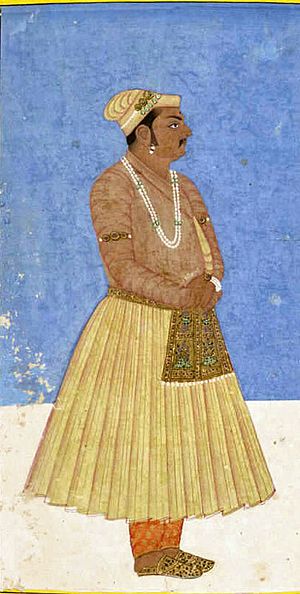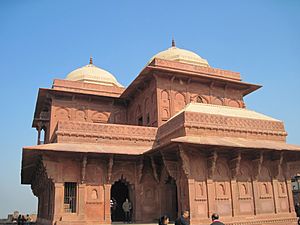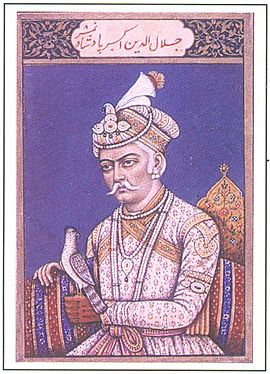Birbal facts for kids
Quick facts for kids Birbal |
|
|---|---|
| Mantri, Mukhya Mantri, Sardār of Akbar | |

Birbal
|
|
| Minister of Mughal Empire | |
| Successor |
|
| Born | Mahesh Das Brahmabhatt 1528 Sidhi Madhya Pradesh |
| Died | 16 February 1586 (aged 57-58) Karakar Pass near the Swat Valley, Kabul Province (in present-day Khyber Pakhtunkhwa, Pakistan) |
| Occupation | Main advisor in the Mughal court of Emperor Akbar |
Birbal (born Mahesh Das; 1528 – 16 February 1586), also known as Raja Birbal, was a very smart advisor and army commander in the court of the Mughal emperor, Akbar. He is famous in India for the many folk tales that show how clever and witty he was.
Birbal was first a poet and singer. Akbar made him a Minister around 1556–1562. He became one of Akbar's closest and most important advisors. He was part of a special group called the navaratnas, which means "nine jewels." In February 1586, Birbal led an army to stop a rebellion in the north-west. Sadly, he was killed in an ambush along with many soldiers. Birbal was the only Hindu person to follow Din-i Ilahi, a new religion started by Akbar. He was one of the first people to join Akbar's court, possibly when he was about 28 years old. Birbal was known for his quick comebacks, generosity, and poetry skills, which made him a perfect courtier.
Many local folk tales about Birbal and Akbar became popular in the 1800s. These stories show Birbal as extremely clever and witty. However, it's unlikely that all these tales are completely true. The Mughal court had very strict rules, and such outspoken behavior might not have been allowed. Also, these tales are not found in official Mughal records. As the stories grew more popular, Birbal became a legendary figure across India. These often fictional tales show him outsmarting other courtiers and sometimes even Akbar himself, using only his intelligence and humor.
Contents
Birbal's Early Life
Birbal was born as Mahesh Das in 1528. His family was a Brahmin family from a place called Ghoghra in Kalpi, Jalaun, Uttar Pradesh. His father was Ganga Das and his mother was Anabha Davito. He was the third son in his family, which had a history of being involved with poetry and literature.
Birbal studied Hindi, Sanskrit, and Persian. He was good at writing, music, and poetry, especially in the Braj language. This helped him become famous. Before joining Akbar's court, he worked for Raja Ram Chandra of Rewa. There, he was known as "Brahma Kavi." Birbal's life improved after he married into a wealthy family. This is different from some stories that say he was poor before he joined Akbar's court.
Life at the Imperial Court
How Birbal Got His Name
It's not exactly clear when Birbal first met Akbar or when he started working at the court. But it's thought to be sometime between 1556 and 1562. Within a few years, he became the Emperor's "Kavi Priya," which means "poet laureate" or favorite poet. Akbar gave him the name 'Birbal' along with the title "Raja" (meaning king), and he was known by this name from then on.
The name Birbal comes from Bir Bar or Vir Var. These words mean "quick thinker" or "one who gives quick answers." Akbar often gave special titles to his Hindu advisors that fit their culture. Some believe the name might come from a character in an old folk tale called Vetal Panchvinshati. This story features a loyal courtier named Vir Var. Akbar loved literature and had many books translated into Persian, including those from Sanskrit and other local languages.
Birbal's Role and Friendship with Akbar
Birbal's growing fame led him to become one of Akbar's nine special advisors, known as the Navaratna or "nine jewels." Birbal was also a religious advisor, a military leader, and a close friend to the Emperor. He served Akbar for 30 years. In 1572, he was part of a large army sent to help Husain Quli Khan against an attack from Akbar's brother, Hakim Mirza. This was his first military job. He also went with Akbar during his campaigns in Gujarat. Even though he didn't have a military background, he often joined Akbar's campaigns and was given leadership roles, just like Todar Mal, who was an expert in money matters.
Historians at the court, like Abu'l-Fazl and Abdul Qadir Badayuni, wrote about Birbal. Abu'l-Fazl respected him and listed him as a commander with many honors. However, Badayuni didn't trust Birbal because he was Hindu. He wrote that Birbal, a Hindu musician, was getting special favor and becoming the king's "confidant" or close friend. But even Badayuni admitted Birbal was talented. Other strict Muslim advisors in Akbar's court were known to dislike Birbal. Unlike some other courtiers who sometimes upset Akbar, Birbal, along with Faizi and Tansen, never seemed to displease the Emperor during their many years of service.

Akbar started a new religion called Din-i-Ilahi. This religion believed Akbar was God's representative on Earth and mixed ideas from both Hindu and Muslim beliefs. In a book called Ain-i-Akbari, it says that Birbal was one of the very few people, and the only Hindu, who followed Din-i-Ilahi. Birbal and Akbar were very close, even though Birbal was 14 years older. Of the nine Navaratnas, Birbal was often called the brightest jewel. Akbar is said to have saved Birbal's life twice.
A painting called Akbari Nao Ratna in Kolkata shows Birbal standing right next to Akbar, showing his important position. The Emperor found Birbal entertaining at first, but later sent him on important missions. Birbal was given a special two-story house in Fatehpur Sikri, very close to Akbar's own rooms. He was the only courtier who lived inside the palace complex. One of the seven gates of the palace is even known as "Birbal's gate."
Birbal's Death
The Yusufzai Afghan tribe started a rebellion along the east side of the Indus river against the Mughal rule. After some Mughal troops lost battles, Akbar sent Birbal with more soldiers. However, the Afghanis were waiting in the hills. In a big ambush, Birbal and over 8,000 soldiers were killed. This was one of the biggest military losses for Akbar. It is said that Akbar was very sad about losing his favorite courtier. He didn't eat or drink for two days. He was especially upset because Birbal's body could not be found for a Hindu cremation. Akbar said it was the greatest tragedy he had faced since becoming emperor.
Birbal's Stories and Legacy
Where the Stories Came From
The Akbar-Birbal folk tales were mostly told from person to person, passed down through generations. These stories often show how Birbal cleverly outsmarts other courtiers who try to make him look bad in front of Akbar. He usually gives quick, funny, and intelligent answers. Other stories show his interactions with the Emperor, where Akbar tries to test Birbal's wit. Birbal always makes Akbar realize his mistakes, which usually ends with Akbar being amused and impressed. Sometimes, Akbar challenges Birbal by giving him a line of poetry that Birbal has to finish. Some stories are just simple, funny tales. In these stories, Birbal often gets out of difficult situations and makes his challengers look silly.
According to C. M. Naim, the first known mention of Birbal's wit is in an 18th-century book called Ma'athir al-Umara. This book says that Birbal became part of Akbar's inner circle because of his poetry and wit, and he slowly became more important than all other courtiers. Naim compares the Akbar-Birbal tales to other Indian folk stories. These include tales about the Vijayanagara emperor, Krishnadevaraya, and his quick-witted minister, Tenali Ramakrishna. Another example is King Krishnachandra and his barber, Gopal Bhar.
Later, a third character named Mulla Do-Piyaza started appearing in the stories. He was probably a made-up character and was shown as Birbal's Muslim rival. He was often portrayed as a supporter of strict Islam. However, when you look at these stories as folklore, they are similar to tales like those of Krishnadevaraya and Tenali Rama. They playfully point out human flaws in the king's character and then show how his behavior can be corrected.
History Versus Folklore
In the folk tales, Birbal is always shown as a good Hindu. He is often older than Akbar and is seen as morally strict, surrounded by Muslim courtiers who plot against him. His success in these stories is only because of his skill. He is shown convincing the Emperor to favor Hinduism over Islam. So, in the stories, he gains religious, political, and personal power over Akbar, using his intelligence and sharp tongue, never violence. However, in real history, he didn't play such a role.
The historian Badayuni didn't trust Birbal but did say that he had "a considerable amount of capacity and genius." A poet named Rai Hol praised Akbar and his nine jewels, especially Birbal, for his generosity. Abul Fazl respected Birbal, focusing on his spiritual qualities and his role as a close friend of the Emperor, rather than just his wit or poetry.
Some modern Hindu scholars say that Birbal helped Akbar make bold decisions. They also believe that the strict Muslims in the court disliked him because he made Akbar turn away from Islam. But there is no proof that Birbal directly changed Akbar's religious beliefs. While sources suggest he did influence Akbar's policies a little, it was mostly Akbar's own affection for Birbal, his religious tolerance, and his open-mindedness that led to this, not Birbal forcing him. Historically, Birbal was more of a supporter of Akbar's religious policies and his new religion, Din-i-Ilahi.
|
 | William L. Dawson |
 | W. E. B. Du Bois |
 | Harry Belafonte |


